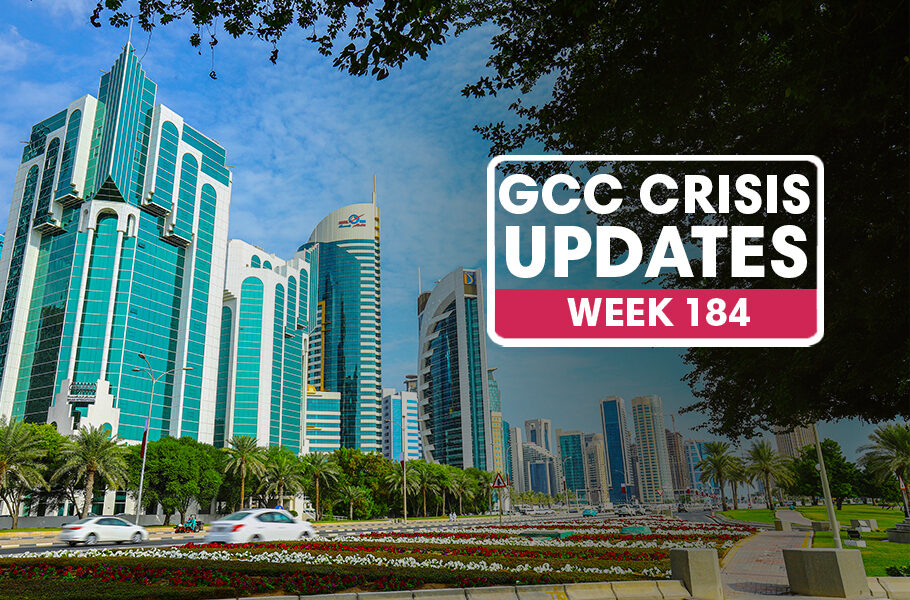
Every Thursday, we bring you the latest updates on the blockade and GCC Crisis. Here's what happened last week: GCC Crisis Updates Week 183.

There is a possibility that tension between Qatar and Saudi Arabia, United Arab Emirates (UAE), Bahrain and Egypt may thaw and ease up before the Gulf Summit that is to take place on 5 January 2021 in Saudi Arabia. Amid this breakthrough in the GCC Crisis, Manama’s Supreme Defence Council, led by King Hamad bin Isa Al Khalifa, stated that there was a need “to end regional conflicts and disputes by peaceful means”, according to the official Bahrain News Agency (BNA) and Al Jazeera.

His Excellency (H.E.) the Deputy Prime Minister and Minister of Foreign Affairs Sheikh Mohammed bin Abdulrahman Al-Thani stressed on Wednesday, 23 December 2020, that there were no obstacles to resolve the GCC crisis at the political level, adding that Qatar did not dwell on small issues, according to QNA.
H.E. the Deputy Prime Minister and Minister of Foreign Affairs was speaking at a joint press conference with H.E. the Foreign Minister of the Russian Federation Sergey Lavrov. His Excellency said that there was a breakthrough in the GCC crisis that took place two weeks ago after the Kuwaiti statement on the issue. His Excellency added that talks are ongoing on reaching an agreement in principle on the framework to accomplish the reconciliation. His Excellency highlighted that the talks were based on foundations that include respecting the sovereignty of countries, and stressed that no country can impose its conditions on the other whether it was the Qatari side or the other side. He noted that talks on a GCC reconciliation took place only with the Kingdom of Saudi Arabia, but the latter was representing the other parties as well

Abu Dhabi's Crown Prince and the United Arab Emirates defacto ruler, Mohammed bin Zayed, has a very close relationship with Banque Havilland, a Luxembourg-based bank owned by financier David Rowland. Although much of the relationship was based on financial advice, the bank also helped Mohammed bin Zayed in other matters which included plotting to attack Qatar's financial markets, just after the UAE along with Saudi Arabia, Bahrain and Egypt broke diplomatic ties with Qatar on 5 June 2017, based on a report by Bloomberg.
One of Rowland's son's who was a senior executive at the bank forwarded a presentation prepared by one of the bank's former analysts to Will Tricks, former MI6 agent who swapped his job for an advisory role with Mohammed Bin Zayed. The presentation
"called for a coordinated attack to deplete Qatar’s foreign-exchange reserves and pauperize its government." (Bloomberg)
Hackers found the presentation which had been saved by the UAE’s ambassador to the US, on his computer under “Rowland Banque Havilland.”The passed it on to The Intercept who posted the story in November 2017.
The presentation, according to The Intercept:
"laid out a scheme to drive down the value of Qatar’s bonds and increase the cost of insuring them, with the ultimate goal of creating a currency crisis that would drain the country’s cash reserves."
In 2019, Qatar sued Banque Havilland and accused it of
"orchestrating a campaign that cost the country more than $40 billion to shore up its banks and defend its currency peg against the U.S. dollar."
(Bloomberg)
The bank defended itself and in court filings stated that what it did was a risk management strategy to protect UAE holdings on Qatari bonds, and not an attack on Qatar's financial system.

About 36 journalists from the Al Jazeera Media Network were hacked using advanced spyware from Israel, and it is believed that the attacks were probably linked to Saudi Arabia and the United Arab Emirates (UAE), according to a report published yesterday by the Univerity of Toronto's Citizen Lab's researchers, which is a cybersecurity watchdog, as reported by Al Jazeera.
The report called the "The Great iPwnJournalists Hacked with Suspected NSO Group iMessage ‘Zero-Click’ Exploit" was released on 20 December 2020, and has detailed how the Israeli Company NSO Group's Pegasus spyware was used to infect and attack mobile phones of 36 Al Jazeera journalists, anchors, executives and producers.
According to the Citizen Lab, the attacks were almost certainly pulled off by the Saudi and UAE governments.
Summarised from Al Jazeera; Bahrain News Agency; QNA, Bloomberg; The Intercept; Al Jazeera; The Great iPwnJournalists Hacked with Suspected NSO Group iMessage ‘Zero-Click’ Exploit
What are your thoughts on these latest developments in the ongoing GCC Crisis? Drop us a line and tell us your thoughts in the comments below, and don’t forget to like and share this article.
Follow us on our social media channels:
![]() @ILQlive
@ILQlive
![]() @ILQlive
@ILQlive
![]() @ILoveQtr
@ILoveQtr
![]() ILoveQatar
ILoveQatar

You have successfully registered your account!
Please confirm your e-mail address by clicking on the URL sent to you.The e-mail usually arrives in 5-10 minutes.
How ajeeb was that!? Thanks for contributing to our community! Your post will appear after we take a quick look!